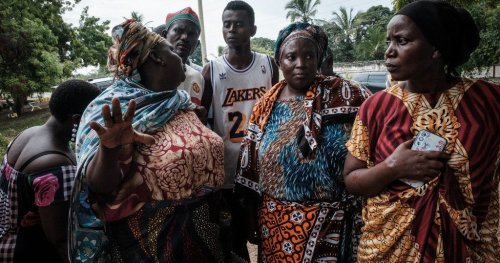The Gang Leader Claiming to be Liberating Haiti
In the heart of Haiti's turmoil, where chaos reigns and fear
grips the populace, one man stands as a symbol of both defiance and aspiration.
Vitel’homme Innocent, a name synonymous with power and controversy, finds
himself on the FBI's "Ten Most Wanted" list, accused of orchestrating
mayhem and unrest. Yet, beneath the veneer of menace, he paints a picture of
liberation, a vision for a Haiti free from the shackles of oppression.
The journey into Innocent's realm is fraught with danger,
navigating through checkpoints manned by armed guards and past the remnants of
a once-vibrant neighborhood now reduced to a ghost town. Yet, amidst the
desolation, lies a mansion adorned with opulence, where Innocent holds court,
offering sandwiches and philosophical discourse to his guests.
At first glance, Innocent appears as a paradox - a leader of
armed gangs who speaks of peace and restoration. He reminisces about a bygone
era when Haiti was hailed as the "pearl of the Antilles," envisioning
a future where Champ de Mars Park is once again a place for simple pleasures
like enjoying ice cream. But reality paints a starkly different picture - a
city engulfed in violence, where bodies line the streets and fear permeates the
air.
Innocent's narrative of liberation is met with skepticism,
especially by those who have suffered at the hands of his gang. Victims like
Marie-Lucie Bonhomme Opont recount harrowing tales of robbery and kidnapping,
dispelling any notion of noble intentions behind the gang's actions. For them,
Innocent's claim to be fighting for the people rings hollow amidst the
atrocities committed in the name of power.
Yet, amidst the chaos, there is a glimpse of complexity in
Innocent's character. He speaks of the corrupt elites who perpetuate Haiti's
suffering, pointing fingers at the very system that he claims to oppose. His
words echo the sentiments of many disillusioned Haitians who see the ruling
class as the true architects of their misery.
The geopolitical landscape adds another layer to the
narrative, with the US Embassy serving as a symbol of foreign intervention in
Haiti's affairs. Innocent's proximity to this stronghold of power underscores
the delicate balance of forces at play, where diplomacy and firepower intersect
in a volatile dance.
As Haiti grapples with its uncertain future, the question of
what it would take to lay down arms looms large. Innocent and his cohorts
demand a seat at the table of governance, seeking amnesty and a plan for the
future. Yet, for many, the idea of granting legitimacy to those who have
wrought havoc upon the nation is unthinkable.
Innocent's story is emblematic of Haiti's struggle for
identity and agency, caught between the aspirations of its people and the
machinations of power. In his words, lies the hope and despair of a nation
grappling with its past and uncertain of its future. Whether he is truly a
liberator or a tyrant remains a question yet to be answered, as Haiti continues
its journey through the shadows of history.





.jpg)